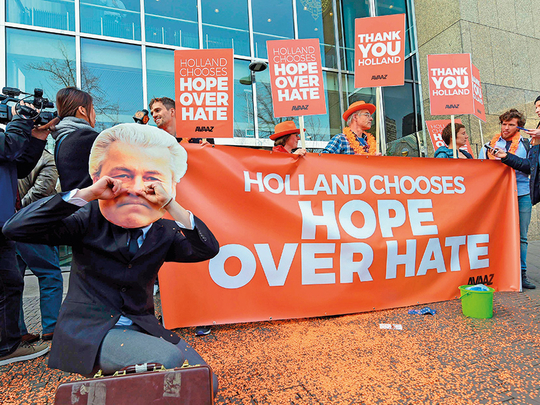
The Hague: Dutch leaders on Thursday began the difficult process of forming a ruling coalition, hours after voters dealt a blow to European anti-immigrant populists with a worse-than-expected result for the insurgent candidate Geert Wilders.
Wilders — whose campaign to ban the Quran and shutter mosques was watched with anxiety by mainstream leaders across Europe — finished second. It was an electoral boost, but still far short of projections that once placed him as the front-runner.
The Dutch campaign was followed closely by French and German leaders who face battles with Wilders’s ideological allies later this year. After the British vote to pull out of the European Union and Donald Trump’s victory in the United States, anti-immigration forces have been on the upswing on both sides of the Atlantic.
But the Dutch results, where parties that favour gentler approaches to refugees gained ground overall, suggested that there may be some limits to populist appeal.
Wilders’ platform was so toxic that most other politicians have sworn not to cooperate with him.
German Chancellor Angela Merkel and French foreign minister Jean-Marc Ayrault both rushed early on Thursday to offer their congratulations to Dutch Prime Minister Mark Rutte, who held on to office even though he lost nearly a fifth of his seats in parliament. Rutte will need at least three other parties to reach a parliamentary majority, a grinding process that is expected to drag on for weeks or even months.
Dutch voters “after Brexit, after the American elections, said no to the wrong kind of populism,” Rutte said late on Wednesday in a jubilant victory speech to his supporters.
But Wilders also sought to emphasise his gains. He captured 13 per cent of the vote on Wednesday, compared to 10 per cent in the previous elections, and boosted his seats by a third.
“Now we are the 2nd largest party. Next time we will be nr. 1!” he wrote on Twitter on Thursday. Earlier in the day, immediately after the results started coming in, he declared that a “patriotic spring” had already begun in Europe, and vowed to continue fighting.
The likely composition of the coalition may also boost Wilders’s claims that establishment politicians on both sides of the political spectrum in the Netherlands are conspiring against ordinary working people.
Rutte will be forced to pull support from a disparate group of parties, not all of which agree on household basics such as taxation and social welfare — key concerns to Wilders’s voters.
Many Wilders voters on Wednesday said that they felt that mainstream politicians had sold them out — echoing similar complaints during the US presidential campaign.
The perils of coalition building were on clear display on Thursday. The centre-left Labour Party — which four years ago was the second-largest party in the Netherlands, and was the junior partner in the coalition — was wiped out. They plummeted to seventh-place, a pitiful showing for a party that was historically a bastion for working-class Dutch support.
Now European leaders will shift focus to the upcoming presidential elections in France, where the anti-immigrant, anti-EU Marine Le Pen has been running strongly ahead of the first round of voting on April 23.
The Netherlands is known as being one of the most historically tolerant and accepting countries in Europe despite the election campaign, and so the results may not have a direct impact on electoral dynamics elsewhere.
But the muted result from Wilders deprives Le Pen of the chance to point to a neighbour and say that an inexorable tide will carry her forward to victory. And opinion polls suggest that she will ultimately lose the presidential race in favour of a more centrist candidate.












